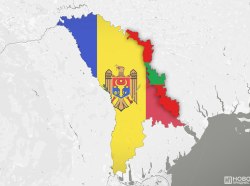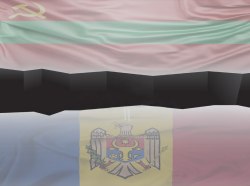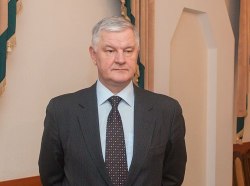Tiraspol, 25 November. /Novosti Pridnestrovya/. The introduction of the Moldo-Ukrainian joint control on the Pridnestrovian border carries a number of serious risks for the Pridnestrovian economy and even endangers the country's food security. Pridnestrovie's losses may be estimated at tens of millions dollars. This is what the deputy minister of economic development, Dmitry Boltrushko, said in an interview with Novosti Pridnestrovya.
According to him, a serious problem lies in the differences between the customs and migration legislation of Moldova and Pridnestrovie. In particular, proceeding from the Moldovan legislation, the production that is subject to phyto and veterinary control can be only imported via fixed checkpoints. However, the Prvomaysk-Kuchurgan checkpoint has not been included in the list of such checkpoints.
Moldova and Ukraine plan to introduce joint control in Kuchurgany in 2016. According to Dmitry Boltrushko, if the joint control is introduced at other checkpoints on the Pridnestrovian border as well, this action may result in a food blockade.
"Therefore, there is a risk that the importation of the products that are subject to phyto- and veterinary control will be blocked, and this is food production. We can speak about a food blockade, Pridnestrovie's food security," said Dmitry Boltrushko.
This decision may also affect Pridnestrovie's individual businessmen. According the ministry's forecast, all importers, including individual persons that have patents, will have to get registered in Moldova, otherwise they will not be able to conduct foreign economic activities and import goods to the PMR.
"Our economic entities are thus compelled to get registered in Moldova, and the registration system, be it interim or permanent, has not been tested - it may not work," said Dmitry Boltrushko, adding that the registration requires the Moldovan citizenship.
The deputy minister noted that if Moldovan laws are applied at these checkpoints (both in Kuchurgany and at those Moldova and Ukraine plan to open later), Pridnestrovian citizens will be deprived of the opportunity to import goods for commercial purposes without getting registered as a legal entity or acquiring a patent. However, it is quite possible after paying corresponding import duties in compliance with Pridnestrovie's current law.
"These measures are exclusively aimed at blocking our economy. This is an extremely destructive measure on both Ukraine's and Moldova's part. Ukraine is in general a guarantor in the negotiation process, and it is unclear in which way it is going to justify or keep this status," Dmitry Boltrushko commented on the situation.
According to the deputy minister, the statements made by Moldovan and Ukrainian politicians that this decision aims to facilitate the conduct of foreign economic activity for Pridnestrovian businessmen are barely more than "soaping eyes". "In fact, this discriminatory measure is aimed at imposing a physically tangible blockade on Pridnestrovie," he added.
The deputy ministry expressed concern that the joint control will restrict Pridnestrovians' rights to import duty-free commodities for personal use.
"Pridnestrovie and Moldova have different norms for free import of commodities for personal use. Our regulations are more liberal, theirs are much stricter. For example, we allow free importation of commodities whose total cost does not exceed $1,000 against 300 euros in Moldova and only a limited list of goods," said Dmitry Boltrushko.
According to him, it is still unclear in which way the importation of goods for personal use whose cost exceeds 300 euros will be legalised. It is likely that even Moldovan customs officers do not have instructions on this and other issues, including duties. "Now we don't fully realise which mode of customs clearance and legalisation will be applied at these joint customs checkpoints. I think neither Moldovan nor Ukrainian customs authorities have any idea what they will do there," said Dmitry Boltrushko.
At the same time, the Ministry of Economic Development forecasts a negative scenario, pursuant to which Moldova will try to impose customs duties and fees on Pridnestrovie's imports. By way of example, Dmitry Boltrushko cited the situation with the excise duty unilaterally imposed in 2014 by Moldova on the goods imported to Pridnestrovie.
"Collecting duties depends on Moldova. At present, our imports are legalised in Moldova, but are not imposed with duties and fees. Now it is free, but what our colleagues, to whom we cannot often get through on simpler issues, are going to do further, we have no idea. For example, imposing an excise in 2014. It was collected for three or four months, and only on 9 May the excise was abolished. But over this period of time, our economic agents transferred a large amount of money to the Moldovan budget, which nobody has returned to us," said the deputy minister.
According to the ministry's preliminary analysis, even if it does not come to collecting these or those payments to the Moldovan budget, Pridnestrovie may lose tens of millions dollars anyway. According to Dmitry Boltrushko, besides economic implications, Moldova and Ukraine's unilateral action will have negative implications for the citizens who are not involved in business activities. In particular, Moldova's border and migration control on the Ukrainian-Pridnestrovian border may affect Pridnestrovians' right for freedom of movement.
The deputy minister said there are a number of precedents when the Moldovan authorities put various obstacles, deported the Pridnestrovians who were returning to the country via Kishinev airport. The same restrictions were applied to some official delegations, which were going to visit the PMR, and the Russian journalists going to the republic.
"Pressure is constantly put on the ordinary Pridnestrovian citizens arriving at Kishinev airport. They are usually told something like 'your passport is sort of a writing pad'. I have also experienced such psychological impacts, when people are forced to apply for a residence permit in Moldova," said Dmitry Boltrushko, emphasising that such measures by the Moldovan authorities go counter to the international law.








